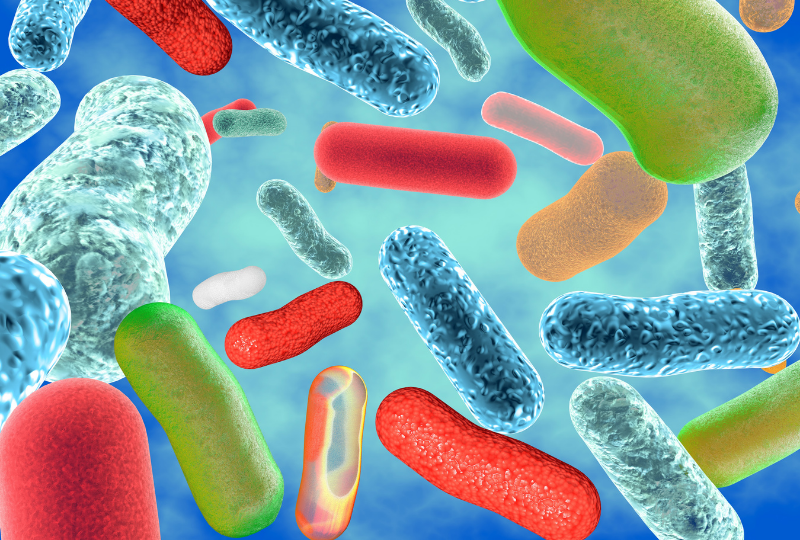
There’s a lot we have learned about the gut microbiome, some of which has led to groundbreaking discoveries about human health.
The past decade has seen great advancements in gut microbiome analysis technology, led by Microba’s co-founders, Professors Phil Hugenholtz and Gene Tyson, who were able to make world-leading microbiome analysis available to the general public, right here in Australia.
Through this technology, scientists are building a growing body of evidence showing the links between the microorganisms in our gut and various health conditions. As we continue to investigate this fascinating area, we are discovering more about the gut microbiome every day, including a few interesting facts you may not have heard about yet!
1. Who you live with helps shape your gut microbiome
We inherit a lot from our parents, including some of the core species of bacteria that are commonly found in the human gut microbiome. However, unlike eye colour or blood type, environmental factors have the potential to shape our microbiome more than our genes. A recent study found that the gut microbiomes of cohabiting, but unrelated individuals, were more similar than related people living apart1. In fact, the microbiomes of parents and their children or pairs of siblings living separately were no more similar than they were to unrelated individuals. This could be because people living together might eat the same foods, share similar lifestyle habits or be exposed to the same environmental microbes. Together, this adds to a growing body of evidence that your environment – including who you live with – actually has a more significant impact on the microbiome than genetics.

Now, you can compare your microbiome with others! Find out more with Insight™.
2. Some bacteria are more impacted by antibiotics while others are more sensitive to changes in living environment.
While many studies focus on the impacts of different lifestyle factors on the gut microbiome a recent study2 attempted to determine which factors determined the persistence of the gut microbiome. Overall, it was shown that the microbiome is relatively stable with bacterial strains within the gut microbiome having on average a 95% chance of still being present 1 year later. As might be expected strain persistence was shown to be lower in children, who are still developing their unique microbiome, and in those who had been exposed to antibiotics. Interestingly, this study showed that species within the Bacteroidota phylum were likely to show the highest persistence within individuals, families and geographic regions but were particularly sensitive to antibiotic interventions. In contrast, bacterial species within the Firmicutes phylum tended to be less stable with their persistence relying on continual reinfection from external sources meaning that they might be most likely to be altered by changes in living environment.
3. Common prescription drugs (and not just antibiotics) have an impact on the microbiome.
While the impact of antibiotic use on the gut microbiome has stolen the spotlight, we now know that other commonly prescribed drugs can also have unintended consequences for this community of microbes. Recent metagenomic studies have shown that in addition to antibiotics, proton pump inhibitors (PPIs), anti-diabetic drugs, anti-inflammatory agents and laxatives have a strong impact on the structure and function of the gut microbiome03,4. For example, PPI use was associated with an increase in species that are usually only found in the mouth, as well as a decrease in beneficial gut microorganisms3. These recent insights highlight the need to consider not only how a drug will affect us, but how it will impact our gut microbiome.
If you are concerned that a medication you are taking might be negatively impacting your microbiome it is important to discuss this with the prescribing health care professional before making any changes to your medication regime.
4. Popular probiotic species aren’t as common in the gut as you might think.
Bifidobacterium species are the stars of any probiotic aisle, making it seem like they are essential for a healthy microbiome. But in fact, there are no particular bacterial species that are essential for health and not one of the 4500 species identified by Microba has been found in everyone. Bifidobacterium species are found at high levels in the breastfed infant’s gut but tend to decrease in abundance as we age5 with around 1 in 4 samples within Microba’s own database containing no detectable levels of Bifidobacterium. So, don’t worry if you don’t see these bacteria in your Insight™ microbiome report, there are plenty of other beneficial microbes that perform similar functions to look for!

Want to know what species are in your gut? Find out with an Insight™ microbiome report.
5. Your gut microbiome can influence how you respond to a certain diet.
The Mediterranean diet has long been praised for its health benefits. Recent studies have revealed that this diet – high in fruits, vegetables, whole grains, nuts and olive oil and low in red meat and refined grains – is linked to improved metabolic and cardiovascular health through positive changes in the gut microbiome6. For example, this healthy eating pattern is associated with an increase in beneficial microbial functions, such as short chain fatty acid production. Interestingly, this effect was strongest in people who had a lower abundance of a species called Prevotella copri (P. copri)7, suggesting that your baseline microbiome influences how you respond to a particular diet. This is supported by another study, which found that an individual’s baseline microbiome was able to predict how they would respond to a six-month weight loss program8. Together, this work provides the foundation for future research that may help us understand how gut microbiome analysis can help guide personalised dietary patterns.
Summary
Advancements in microbiome sequencing technology has enabled an explosion of research helping us to understand how our microbiome influences our health but also how our diet, lifestyle, medication, and supplement use impact our microbiome. Microba continues to investigate these emerging insights, and while there is a lot we have already learned in the last decade, there is still so much more to uncover.

Find out the current state of your gut microbome with Insight™ gut microbiome analysis.
This microbiome test is not intended to be used to diagnose or treat medical conditions. A full disclaimer is available here
References
Rothschild, D., Weissbrod, O., Barkan, E. et al.
Environment dominates over host genetics in shaping human gut microbiota.
Nature, 2018; 555, 210–215. Doi: https://doi.org/10.1038/nature25973
Hildebrand F, Gossmann TI, Frioux C, Özkurt E, et al. .
Dispersal strategies shape persistence and evolution of human gut bacteria.
Cell Host Microbe, 2021;S1931-3128(21)00236-5. Doi: https://doi.org/10.1016/j.chom.2021.05.008
Vich Vila A, Collij V, Sanna S, et al. .
Impact of commonly used drugs on the composition and metabolic function of the gut microbiota.
Nat Commun. 2020; 11(1):362. Doi: https://doi.org/10.1038/s41467-019-14177-z
Macke L, Schulz C, Koletzko L, Malfertheiner P. .
Systematic review: the effects of proton pump inhibitors on the microbiome of the digestive tract-evidence from next-generation sequencing studies.
Aliment Pharmacol Ther. 2020 Mar; 51(5):505-526. Doi: https://doi.org/10.1111/apt.15604
Arboleya S, Watkins C, Stanton C, Ross RP. .
Gut Bifidobacteria Populations in Human Health and Aging.
Front Microbiol, 2016;7:1204. Doi: https://doi.org/10.3389/fmicb.2016.01204
Wang, D.D., Nguyen, L.H., Li, Y. et al.
The gut microbiome modulates the protective association between a Mediterranean diet and cardiometabolic disease risk.
Nat Med. 27, 333–343 (2021). Doi: https://doi.org/10.1038/s41591-020-01223-3
Holdeman, L. V. & Moore, W.E.C.
New Genus, Coprococcus, Twelve New Species, and Emended Descriptions of Four Previously Described Species of Bacteria from Human Feces.
International Journal of Systematic and Evolutionary Microbiology, (Apr 1974) . Doi: https://www.microbiologyresearch.org/content/journal/ijsem/10.1099/00207713-24-2-260
Jie, Zhuye et al.
The Baseline gut microbiota directs dieting-induced weight loss trajectories.
Gastroenterology 160(6), 2029-2042.E17 (Jan 2021). Doi: https://doi.org/10.1053/j.gastro.2021.01.029


